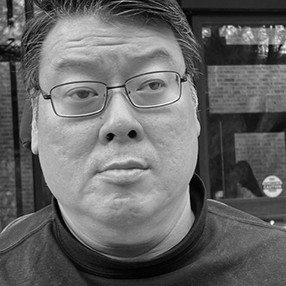for the young who ask, “How did you learn to like yourself?”
There are glaciers, imposing, yet shrinking.
There is the iris, violet sky cradling shards of sun.
The white Bengal tiger, snow and black ink.
Infinite reasons I could give for gladness,
though none may salve the wound from which
your question arises, how to be glad to be alive?
Stitch your heart’s fissure: recall family, friends,
a slap, cigarette burn, the rod, something smashed
down, or welled up in your darkened pupil.
Turn outward: two A.M. streets, the creeps in cars,
the chaos of human folly delivered by calm,
coiffed news anchors. The wound is within you
and not. The answer within you and not.
Want, comfort, desire, love ought not be wounds.
We pine for them from our first wail,
what you must give and take, till no voice is left.
Copyright © 2023 by Johnson Cheu. Originally published in Poem-a-Day on July 21, 2023, by the Academy of American Poets.
“Young people often ask me about living with a disability. For my generation of disabled persons, growing up with mostly only telethons as images of disability, bitterness, depression, and tragedy were (and sometimes still are) presumptions. It doesn’t surprise me, working with students who are coming to terms with who they are, that I get asked about ‘liking myself.’ What’s surprising is how these negative stereotypes of anger, bitterness, etc., remain, even today. The poem begins with images of nature and beauty, in part to counter the history of ugliness and ‘freaks’ that are a large part of disability history. The poem ends with the idea of voice, which is what so many young people are trying to find for themselves.”
—Johnson Cheu

